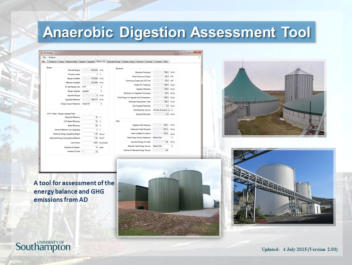






ADNet@soton.ac.uk
Anaerobic Digestion Assessment Tool
Recent BIV work done by the University of Southampton with IEA Task 37 (UK) has produced a new program-based modelling tool for anyone interested in modelling an AD system. At its simplest, it can be used to calculate potential biogas (and electrical) output for a system, but it is complex enough to calculate wider energy balances across a whole AD system. The model includes a wide variety of potential AD feedstocks, but users are also able to enter their own values. It is also possible to compare scenarios and to export all the information as a .CSV in order to further manipulate and analyse the outputs. This is a really useful tool and it’s FREE! Download it from the Bioenergy and Organic Resources Research Group website.Renewable Energy Association / Bangor University
BIV focusses on GHG cost-effectiveness of small-scale AD
Professor David Styles of Bangor University worked with the Renewable Energy Association (REA) to evaluate cost-effective greenhouse gas abatement by small-scale anaerobic digestion. The project focussed on the benefits of small scale AD largely based on manures/slurries, with a particular focus on GHG emission abatement potential and cost effectiveness in abating CO2e emissions when compared with other options. The report concludes that even at a FIT rate of £0.20 per kWh, small scale farm AD largely based on manures/slurries would represent very cost-effective GHG abatement. The REA news item can be found here, the report here, a summary poster here and a policy summary here.Tracking Functional Microbiomes of UK Anaerobic Digesters
This 1 year project, funded by BBSRC and led by Professor Orkun Soyer at the University of Warwick, focuses on furthering our understanding of anaerobic digestion, particularly on how the complex microbial communities affect and are affected by operational conditions. Altogether, 16 UK full scale AD reactors are taking part in the project, where both genetic and meta-data are collected weekly. The large amounts of genetic data will allow us to characterise which species of microbes inhabit the digesters, what their functions are and, importantly, how they change over time. The meta-data will allow us to monitor changes in response to their environment. The datasets will be made available through the project website at http://anaerodynamics.com, funded by the AD Network. These will provide an unbiased and transparent source of information on the performance of industrial AD reactors in real time, which we hope will help to enhance and expand this technology in the UK. Enquiries can be directed to: Prof. Orkun Soyer.Anaerobic Digestion Network Achievements
Download our achievements brochure and see some of the activities that the Network has been involved in.Global Challenges Research Fund -AD Network Report
The AD Network ran a number of workshops in sub-Saharan Africa in order to better understand research gaps. See the full report here.



- Current Events
- Previous Events
- Research Colloquium 2019
- ECR 2018 York
- ADNet/FoodWasteNet - Valorisation of ABPs - Mar 18
- Supergen/ADNet Integration - Feb 18
- Research Colloquium 2017
- Novel Feedstocks Lincoln - Apr 17
- Joint NIBB ECR Careers
- ADBA AD Net R&I - Mar 17
- GCRF Johannesburg & Stellenbosch
- GCRF Nairobi Workshop - Jan 17
- IFA Aspatria - Nov 16
- AFBI Small Farm AD - Nov 16
- MEC Newcastle - Sep 16
- Early Career Researcher - Jul 16
- UK AD & Biogas R&I - Jul 16
- AnMBR In-situ Cleaning - Jun 16
- Science Meets Industry - May 16
- R&I Photo Gallery - Apr 16
- AnMBR Workshop - Jan 16
- AD Network at AD Biogas - Jul 15
- Early Career Researcher - Jun 15
- R&D Photo Gallery - Apr 15
- Travel & secondment
- Secondments and overseas travel bursaries



















